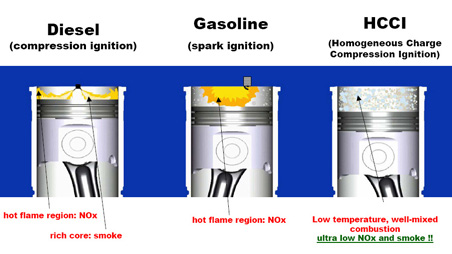Bosch Engineers Push Forward with HCCI Engine
Tim Esterdahl | Jan 26, 2012 | Comments 6
Bosch Engineers have begun work on a new engine that could combine the efficiency and reliability of diesel engines with the lower emissions of gasoline. This new engine called the HCCI engine, Homogeneous Charge Compression Ignition, could be the future of automotive engine development.

The graphic shows the difference between HCCI, diesel and gasoline engines. Graphic courtesy of the Robert Bosch Corporation.
The idea for this engine was first conceived in the 70s and it still has automotive engineers working hard to make it reliable. The problem is that this engine needs to run at low speeds with the lack of ignition spark like the diesel engine, but then at higher speeds it needs the ignition spark. Finding a way to blend the two technologies in a way that is safe and seamless has been the tricky part.
GM had made a prototype Saturn that proved this engine could idle well at a low rpm range which was a huge step in the right direction. Bosch engineers say that the seamless integration is very doable, it just takes some finessing with the engine control computer to time the switch exactly right. Once this has been perfected, there will be a new engine with a roughly 30% increase in fuel economy and a considerable decrease in emissions.
Related Posts:
Filed Under: Auto News


Very Interesting read, I wonder if Toyota has been working on something similar to this?
Maybe they should skip trying to do this with a liquid fuel and go with Natural Gas? I would think it would be easier to achieve the “well mixed combustion”.
Bobby – I’m sure they’ve got someone somewhere looking into it, but from what I’ve read and heard it’s not high on the priority list.
LJC – Very interesting point. However, a question: does Natural Gas become a liquid at these types of pressures?
Well that is unfortunate. So I guess we won’t have 60MPG Honda Insights and Toyota Priuses until ~2020…
1 of the key challenges will be manufacturing cost of these high-tech engines as well as long term reliability and maintenance costs.
It’ll be interesting how it turns out.
I have also heard of RCCI (reactivity control charge compression ignition) and PCCI (premixed charge compression) engines, which can be even more efficient.
There are also Carnot engines but I’m not sure if it is feasible in a car.
Yes I have heard of HCCI natural gas engines too
these are the advantages of HCCI.
Lean combustion returns 15 percent increase in fuel efficiency over a conventional spark ignition engine.
Cleaner combustion and lower emissions (especially NOx) than a conventional spark ignition engine.
HCCI is one which combines the best properties of diesel and gasoline engines all at one.
in HCCI we have compression ignition system, meaning that instead of using spark plugs to ignite the air-fuel mixture within the cylinder they use the pressure of the piston to compress the mixture, creating heat and ignition. Because compression ignition is inherently more efficient as compared to spark system.